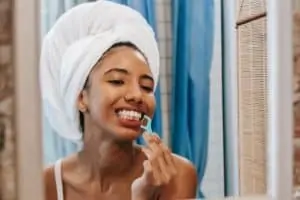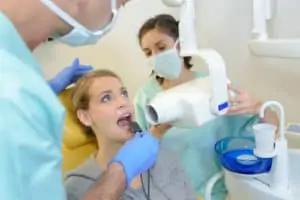General Dentistry

What is Sleep Apnea?
Sleep apnea is a dangerous condition that not only keeps you and your loved ones from getting a solid eight hours of sleep a night, it could also mean that your body isn’t getting enough oxygen while you’re catching Zs. Sleep apnea occurs when someone stops breathing during sleep, sometimes up to 100 times a night! One of the most concerning parts about sleep apnea isn’t even the snoring itself, it’s the fact that you may not even know that it’s happening.
Types of Sleep Apnea
It’s important to note that not everyone who snores suffers from sleep apnea, that’s one reason why it can be so hard to diagnose. However, snoring is one of the most common signs of sleep apnea. There are two types of sleep apnea:
1) Obstructive Sleep Apnea (OSA) – The most common form of sleep apnea is the type called obstructive sleep apnea. OSA occurs when the airway becomes blocked during sleep due to the soft tissues in the back of your throat collapsing.
2) Central Sleep Apnea – This type of sleep apnea may not directly involve a blocked airway, but it does involve a problem with how your brain signals your breathing muscles. Oftentimes, the brain fails to signal the breathing muscles to breathe. Cases of central sleep apnea are more difficult to diagnose.
Snoring & Oral Health Concerns
According to the American Sleep Apnea Association, roughly 90 million Americans snore. And, as we’ve noted, sometimes snoring is simply annoying and not caused by sleep apnea. But that doesn’t mean these primary snorers aren’t at risk. In fact, your dentist in Sparks may ask if you snore because it can affect your oral health. Snorers breathe out of their mouths instead of their noses which can quickly dry the mouth out and reduce saliva production. Saliva is crucial to maintaining good oral health as it neutralizes acids and helps rinse away bacteria. Without it, snorers may be at increased risk for:
- Dry mouth
- Gum disease
- Bad breath
- Cavities
- Tooth loss
If you wake up with a sticky mouth, dry mouth, or bad morning breath, you may be mouth breathing or snoring during sleep or have sleep apnea. Your dentist in Sparks, will encourage a visit to a sleep center and want to keep a closer eye on your oral health.
Preventing Problems
To combat any negative side effects of snoring or sleep apnea, you should always make sure to:
- Brush and flossing twice a day
- Drink plenty of water
- See your dentist in Sparks twice a year
Snoring isn’t something you should take lightly. If you’re concerned about your snoring, talk with your dentist about possible treatment options either from a medical doctor or dentist.

Protect & Prevent
Your dentist in Sparks recommends that everyone has a preventive dentistry checkup at least twice a year. And for a good reason. These appointments help your dental team keep a close eye on oral health, detect any changes, and remove tough plaque buildup that can’t be removed at home. When caught early, many oral health problems can be treated easily and before they have a chance to put the rest of the body at risk.
But, according to the Academy of General Dentistry, men are less likely to see their dentist regularly and rather only visit when they’re already having signs of a problem, which can be too late for some situations. Since many men forgo preventive dental appointments, they’re often at more risk for oral health problems.
3 Oral Health Problems That Are More Common In Men
While men are at more risk for several minor dental problems such as cavities, there are also some serious conditions that tend to affect men more than women.
- Gum Disease. Gum disease is a serious infection that starts in the mouth but can affect the rest of the body if not treated promptly. In fact, studies have shown a connection between gum disease and an increased risk of heart disease, certain cancers, respiratory problems, and poor prostate health in men. Plus, gum disease can also cause tooth loss. According to The American Dental Association, around 34% of men ages 30-54 have gum disease as compared to 23% of women in the same age range.
- Oral Cancer. The second serious oral health condition that tends to affect men more than women is oral cancer. In actuality, men are twice as likely to get oral cancer than women and are four times more likely to get oropharyngeal cancer, cancer that affects the way back of the mouth. Oral cancer can be treated, but it’s crucial to catch it early before it has a chance to spread. Your dentist in Sparks will check for signs of oral cancer at each visit, which makes those six-month checkups even more important.
- The Need for Advanced Dental Care. Prevention is key to keeping teeth and oral health protected against serious dental concerns. However, when preventive appointments are missed, patients are more likely to need advanced dental care. What was once a probably easy and quick treatment may now require more complex care such as a root canal, dental crown, extraction, or dental implant. If you wait to see your dentist in Sparks until you have a problem, chances are the issue has already progressed to a serious level.
Even though everyone should visit the dentist regularly, men often need a bit of nudge to do so. But the benefits of bi-annual dental visits are immeasurable, so commit to seeing your dentist (and your medical provider!) regularly for routine checkups to protect your body before you experience a problem.

Not Flossing = Not Thoroughly Cleaning
Your dentist Sparks recommends brushing your teeth every day. It’s also recommended that you floss every day. Why? Well, you see, if you only brush your teeth, you’re missing out on cleaning about 35% of each tooth. In fact, there’s more to teeth than just the front, back, and chewing surface. There are also sides and a top. The only way to remove bacteria and plaque buildup from those areas is to floss in between each and every tooth, each and every day.
More On Plaque
Plaque naturally builds up on our teeth throughout the day, but it’s important to remove this plaque before it has a chance to harden into tartar. To remove the plaque effectively, you must both brush and floss. Once plaque hardens into tartar, it isn’t something that can be removed at home with regular brushing. It will need to be removed at your next appointment with your dentist in Sparks. But that’s not all.
Gum Disease
One of the main reasons why flossing is so important is to protect teeth against the dangers of gum disease. When food particles, bacteria, and plaque are left lingering between teeth, it can cause inflammation. This inflammation is usually recognized by bleeding gums, and bleeding gums is never normal and is usually a sign of a bigger problem. Gingivitis, the earliest stage of gum disease, is almost always first detected when the gums bleed during brushing or flossing. The good news is that gingivitis can be reversed if caught and treated early. However, when gingivitis isn’t treated promptly, it can develop into gum disease.
Gum disease is a serious oral health problem that affects both oral health and overall health. The longer it’s left alone the more likely it is to lead to complications, such as:
- Heart Disease
- Stroke
- Diabetes
- Respiratory Disease
- Tooth Loss
Not Flossing is Common
More than 30% of Americans don’t floss every day, so if you’re one of them please know you’re not alone. It’s important to be honest with yourself and your dentist in Sparks about your flossing habits so your treatment is thorough and catered to you.
Be a Floss Boss
Even though some studies may suggest no link between flossing and protection against cavities, we do know that flossing can help protect against gum disease. This makes flossing a crucial part of everyone’s oral hygiene routine. However, choosing the best floss for you may take some time to find. After all, there are several flossing options to choose from, including:
- Waxed or Unwaxed String Floss
- Floss Picks
- Dental Tape
- Water Flosser
The most important thing to consider when choosing floss is to find something that you’ll use daily.
If you have questions about picking the right floss or understanding why it’s important to floss in the first place, contact your dentist to schedule an appointment.

How Hormones Hamper Oral Health
All women know that their lives are full of changes, particularly hormonal changes, that can affect them at different stages. While many people associate hormonal changes with emotions and mood (among other things), your dentist in Sparks wants you to know that hormones can also affect your oral health and put you at increased risk for gum disease and other oral health problems.
- Puberty
Pre-teens and younger teenage women start their hormonal journey with puberty. Puberty usually begins between age 8 and 14, although it can vary from person to person. While the body will go through a lot of changes during this time, one of the largest changes is not visible — hormonal changes. These fluctuations in hormones are to thank for changes in emotions and mood, but they can also increase estrogen levels as well as progesterone levels. The increase in these hormones can often increase blood flow in the mouth, particularly concentrating on the gums. This can cause young women to have red, swollen gums that often bleed during brushing or flossing. If this happens, it’s incredibly important to keep brushing and flossing regularly to remove bad bacteria. If you’re concerned about bleeding gums, see your dentist in Sparks.
- Menstruation
Once a woman begins her menstrual cycle, hormones will continue to rise and fall each month. She may also still have red, swollen gums that bleed – usually a few days before her period. Canker sores are also common during this time. Typically, the bleeding gums and canker sores will go away on their own. If they don’t, see your dentist. Hormonal changes during menstruation can also cause dry mouth. Dry mouth has been linked to bad breath as well as cavities.
- Pregnancy
If a woman decides to become pregnant, it’ll be even more important to take care of her teeth. After all, poor oral health during pregnancy has been linked to premature births, gestational diabetes, and preeclampsia. Brushing and flossing every night is also incredibly important for a mom-to-be since pregnancy gingivitis is also a common side effect of hormonal changes. Pregnant women should visit their dentist in Sparks during the second trimester or if they experience a dental concern.
- Menopause
Once a woman is past her childbearing years and enters menopause, she will once again experience shifts in hormones. Menopause usually happens between 45 and 55, and during this time, estrogen levels decrease. This loss of estrogen can put a woman at risk for osteoporosis and bone loss. The bone loss can easily affect the jaw bone and put teeth at increased risk of falling out. But don’t worry, even if natural teeth fall out, they can be replaced with dentures, dental implants, or other dental treatments.
We care for the health of our entire community, women and men alike, and strive to do everything we can during each stage of life to get and keep mouths and bodies healthy. Don’t hesitate to schedule a visit with us today.

- Small Problems Become Big Problems
When a population starts to put off dental care, a lot of the typical prevention measures are lost. This often means that problems that were once small and easy to treat were left undiagnosed, untreated, and led to bigger problems. Something that may have started as a tiny cavity can turn into a large area of decay and cause pain. Someone who may have had early-stage gum disease now has full-blown advanced periodontal disease and are at risk for whole-health complications such as heart disease. This is why those preventive dental visits every six months are so important to keep your mouth, and your body, healthy.
- High-Risk Patients Need Dental Care
Even though many high-risk patients understandably shied away from seeing their dentist in Sparks in 2020, it’s this population that needs regular dental care the most. In fact, sometimes patients with certain health conditions are encouraged to see the dentist every three months instead of the regularly recommended six. But during the pandemic, patients weren’t getting a checkup for nine months or even a whole year. This resulted in more serious dental problems and complications that may have required a tooth extraction, root canal, or other treatments. What’s more is high-risk patients are more likely to suffer from more than one problem, which can compound the issues.
- Dentists in Sparks Are Safe
The early months of 2020 saw dental offices close, sometimes for a couple of months. In fact, the World Health Organization reports that dental offices were some of the most negatively affected health services during COVID-19. However, dentists are already required by law to have very strict sanitation practices and have added additional safety precautions such as gowns, better masks, and disinfection protocols above and beyond the already comprehensive standards. Additionally, once dental offices reopened, the FDI World Dental Federation reported that dental offices around the globe had significantly lower infection rates of COVID-19 than other healthcare workers.
So what does all of this mean? Essentially, it means that dental care is essential. It’s essential to keeping our communities healthy, preventing small problems from turning into big problems, and that it’s even more important for high-risk patients to be seen by their dentist in Sparks twice a year. What’s more, dentists can see patients safely.
Don’t put your dental health on the backburner. Call us to schedule an appointment today.

At-Home Treatment
If you happen to crack a tooth at night or on a weekend when your dentist may not be readily available, try these tips for temporary help:
- If you can, take over-the-counter pain medication.
- Use a dental anesthetic to help numb the area.
- Rinse with warm salt water a few times a day to remove bacteria.
- Apply an ice pack to your cheek to reduce swelling.
Signs of a Cracked Tooth
Sometimes you can crack a tooth and not even know it. But most often, a cracked tooth comes along with a few key signs, including the following from the American Association of Endodontists:
- Pain while chewing
- Sensitivity to hot, cold, and sweets
- Pain that comes and goes
Cracked Tooth Treatment
If you do crack a tooth, don’t worry. There are several different ways that your dentist in Sparks may use to fix it.
Bonding – Bonding is a simple, painless way to repair a cracked tooth. Your dentist will fit the crack with a sticky resin, harden it using a special light, and restore your tooth.
Dental Crowns – Another option to treat a cracked tooth is a dental crown. This is usually more appropriate for a larger crack. Your dentist in Sparks will create and place a custom crown over the affected tooth, protecting it from more damage. Each crown is designed to match the shape, color, and size of your other teeth so nobody will ever know it’s there.
Root Canal – If a crack is deep enough to affect the inner tooth, you may need a root canal. A root canal may sound scary and painful, but the opposite is true. During a root canal, your dentist will remove any affected pulp which will relieve any pain you may have. A root canal can also protect you from developing an infection.
Tooth Extraction – When a cracked tooth goes beyond repair and affects too much of the natural tooth structure, your dentist may recommend an extraction. However, many times, extracted teeth can be replaced with a dental implant or bridge so you don’t need to live with a missing tooth.
It is possible to have a cracked tooth and not know it. However, the longer a cracked tooth goes undetected and untreated, the more it can lead to bigger problems. This is why it’s so important to see your dentist at least twice a year. These regular visits help identify any problems early while they’re easier to treat.

Tooth Decay
When we talk about cavities, we’re essentially talking about tooth decay. Tooth decay is a disease that wears down tooth enamel and can affect the inner workings of teeth – including the dentin and the pulp. The deeper the decay goes, the more likely it is that you’ll experience symptoms. Decay can occur for a number of reasons, so it’s important to understand the causes so that you can take steps to prevent it.
- Oral Hygiene
One of the main causes of decay and cavities is a result of poor oral hygiene. You should brush your teeth twice a day, morning and night. But brushing alone isn’t enough to fully protect your teeth. You should also floss in between each and every tooth every day. If you don’t floss, you’re missing out on cleaning a large portion of your teeth, and it can put you at risk for tooth decay. In fact, most adult cavities form in between teeth.
- Sugar & Plaque & Bacteria, Oh My!
The other main cause behind dental decay is a combination of what we eat and how our mouths react during digestion. Let’s take sugar as an example. While you may think that sugar causes cavities, your dentist in Sparks wants you to know that that’s not entirely accurate. You see, it’s not the sugar that causes decay but rather how the sugar feeds bacteria that causes cavities. When we consume sugary foods or drinks, the bacteria in our mouths feed on the sugar and release an acidic byproduct. This acid attacks tooth enamel which can lead to erosion and, eventually, decay.
Cavity Symptoms
There are times when you won’t even know that you have a cavity. This happens when the decay is in the early stages and it’s also when it’s the easiest for your dentist in Sparks to treat. However, when the decay affects the inner tooth and hits the nerves, you may start to notice some common cavity symptoms, including:
- Increased sensitivity
- Pain when biting down
- Seemingly random tooth pain
- Pain when eating sweets
- Visible holes
If you’re experiencing any of these symptoms, call your dentist to schedule an appointment.
The best way to prevent cavities requires a few different things. But the good news is, they’re all easy. Make sure you brush your teeth twice a day, floss once a day, and see your dentist in Sparks twice a year. Also, try to limit your intake of sugary treats and drinks to reduce the chance of cavities.

What Are Dental X-Rays?
Just like an x-ray of your arm or leg, dental x-rays take images that show the hard surfaces in your mouth. The energy of x-rays passes through the skin and highlights only dense areas such as teeth and bone. The skeletal-like images produced from x-rays give your dentist in Sparks an inside look at your oral health and can help identify problems that can’t be seen through a visual or manual dental exam alone.
What Do Dental X-Rays Show?
We already know that dental x-rays show the teeth and bone, but what does your dentist look for on x-rays? The truth is, x-ray images can identify several things that could otherwise be missed and progress into more serious problems.
- Decay
Dental x-rays are most commonly used to help diagnose decay and cavities when they’re still small and easier to treat. You may not yet even have any signs of a cavity, but a quick x-ray can show one developing. X-rays can also catch decay that can develop under a previous dental restoration such as a crown or a filling. Finding and treating these areas of decay early can save you from ever experiencing the pain that could result if left alone.
- Abscess
When a patient has a toothache, their dentist in Sparks will most likely start by taking a few x-rays to get a closer look at the area. Oftentimes, a toothache can be a sign of an infection, also known as an abscess. To treat an abscess, your dentist will most likely remove the infected area of the tooth and may choose to cap it with a dental crown. Severe cases may even require an extraction.
- Bone Loss
Our teeth are typically strongly secured into our jaw bone. But things like gum disease, missing teeth, and osteoporosis can cause the jaw bone to deteriorate. This bone loss can increase the risk of tooth loss, cause headaches and jaw pain, and can even affect the appearance of the face making it appear wrinkly or saggy.
Are Dental X-Rays Safe?
We understand that there may be some concerns surrounding the use of dental x-rays and exposure to radiation. However, advancements in dental technology have made digital dental x-rays one of the lowest forms of radiation emission. In fact, research conducted by the Kois Center for Dental Education shows that four bitewing x-rays emit only 0.005 mSv (millisieverts) of radiation. This is less than what humans are exposed to naturally every day.
Even though you may not get dental x-rays at every appointment, you should get them when they are recommended. They will help your dentist provide personalized care, catch and treat problems early, and help you maintain a healthy smile.

Avoid Using Teeth To Open Packages
We’ve all been there — hungry for lunch with a delicious bag of chips waiting for us. We go to open it and it’s just… stuck. We pull and pull but we just can’t get the bag to open. So instead, we grab the bag between our teeth, bite down, and rip. Finally! Crunchy, crispy chips. While this tactic can successfully open packages, it can also cause tooth damage. When you encounter pesky packaging, tough tape, or tricky tags take a few extra minutes to find a pair of scissors and save yourself a potential trip to your dentist in Sparks.
Don’t Use Teeth To Help Carry Things
Another common way we tend to use our teeth as tools is to try and have them function as another hand to help us carry or hold things. However, our teeth aren’t meant to grip and hold on to things like nails, pencils, or even your cell phone. Doing so can also increase the risk of breaking or cracking teeth as well as put you at risk for choking.
Keep Things Out of Your Mouth
Anything that’s not food shouldn’t go anywhere near your mouth. This includes things like fingernails, pens, and jewelry. Chewing on non-food items can damage your teeth and your jaw and require treatment from your dentist in Sparks. Besides, a lot of these things can contain a lot of germs so the last place you should put them is in your mouth.
Take It Easy On The Nuts
Nuts are a great, nutritious snack that is packed with protein. They’re also pretty convenient and can travel easily. However, nuts have shells, and if you buy unshelled nuts, you’ll have to remove the casing to get to the edible inside. The most common way to do this is to crack the shell between teeth. This can once again lead to chips, cracks, or broken teeth. Other food items that can also damage your teeth in a similar way are popcorn, pumpkin seeds, and sunflower seeds.
Our teeth are incredibly tough and the protective enamel is actually the strongest substance in the human body. However, as with everything, teeth do have their limits to what they can withstand. To help protect your teeth, use them only to chew your food and avoid using them as any sort of tool. And of course, make sure to see your dentist in Sparks every six months for preventive dental checkups.

Oral Health is Linked to Overall Health
If your goal for this year is to get healthier overall, you can’t ignore your oral health. After all, our oral health is directly linked to our overall health and one can certainly affect the other. So as you commit to getting your 10,000 steps a day or eating healthier, make sure you also consider the following.
- Drinking Water
We often hear about patients wanting to cut back on sugary soda in the new year and drink more water. This is one of the best things you can do for both your whole body and your mouth. Water allows our bodies to function properly and keeps the mouth hydrated and moist which can help fight off cavity-causing bacteria. Aim to drink at least eight 8-ounce glasses of water every day.
- Quitting Smoking
Another popular, yet difficult, resolution year after year is to quit smoking. This can be an intimidating endeavor but with a good plan and a solid support system, we believe anyone can stop smoking. There are countless overall and oral health benefits to quitting including reducing the risk of cancer and lowering the likelihood of gum disease.
- Practicing Good Oral Hygiene
Everyone knows that your dentist in Sparks wants everyone to brush and floss every day, but we also know that this simple task can get overlooked and go undone. However, brushing and flossing your teeth each and every day is the best way to prevent dental problems from popping up. Make sure you brush twice a day and floss at least once a day to protect your pearly whites from cavities, gum disease, bad breath, and other problems.
- Keeping Your Dental Appointments
We always recommend that patients see us for professional dental cleanings and checkups twice a year, and sometimes more often. These bi-annual appointments are crucial to maintaining a healthy and mouth as well as a healthy body. They allow your dentist in Sparks to find any potential problems early and treat them quickly before they become big problems.
Make a promise to yourself that you will commit and follow through with your 2021 resolutions. And if you’re serious about getting healthier, schedule an appointment with your dentist today.
